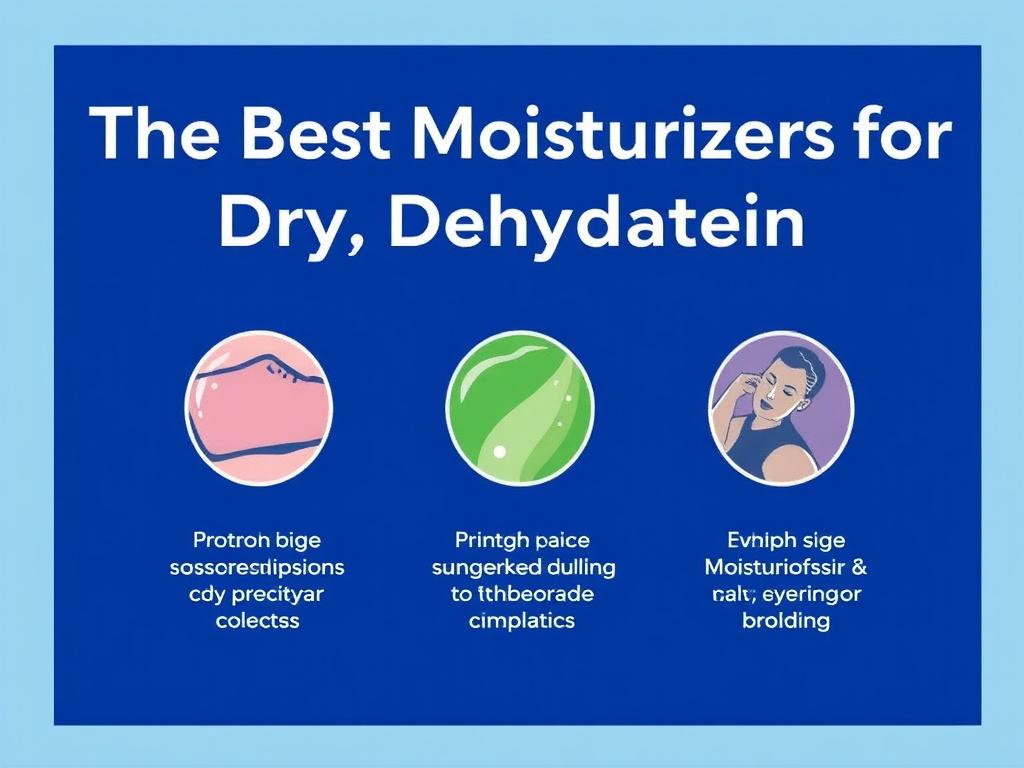Содержание статьи
- 1 Understanding Dry vs. Dehydrated Skin
- 2 Key Ingredients to Look for in the Best Moisturizers for Dry, Dehydrated Skin
- 3 Top Moisturizer Types for Dry, Dehydrated Skin
- 4 How to Choose the Best Moisturizer for Your Skin
- 5 Recommended Best Moisturizers for Dry, Dehydrated Skin
- 6 Tips for Maximizing Moisturizer Benefits
- 7 Common Mistakes to Avoid When Treating Dry, Dehydrated Skin
- 8 Natural Remedies and DIY Moisturizers for Dry, Dehydrated Skin
- 9 When to See a Dermatologist
- 10 Final Thoughts on Finding the Best Moisturizers for Dry, Dehydrated Skin
Dry, dehydrated skin can feel uncomfortable, tight, and sometimes even painful. If you’ve ever struggled with flaky patches, dullness, or that tight sensation after washing your face, you know how important it is to find the right moisturizer. But with so many products on the market claiming to be the best moisturizer for dry skin, how do you choose? And what about understanding the difference between dry and dehydrated skin? This comprehensive guide will walk you through everything you need to know about the best moisturizers for dry, dehydrated skin, helping you restore your skin’s natural glow and comfort.
Understanding Dry vs. Dehydrated Skin
Before diving into the best moisturizers, it’s crucial to understand what dry and dehydrated skin really are. Many people confuse these two terms, but they are quite different.
Dry skin is a skin type—meaning it’s a consistent condition caused mainly by genetics. Dry skin lacks oil (sebum), leading to a flaky, rough surface and a feeling of tightness. People with dry skin often need richer, oil-based moisturizers that help replenish the lipid barrier.
Dehydrated skin, on the other hand, is a skin condition that can affect all skin types and is caused by a lack of water inside the skin’s layers. Dehydrated skin can feel tight and look dull or flaky, but the underlying issue is a loss of moisture, not oil. Lightweight, water-based moisturizers or products containing humectants like hyaluronic acid are best for hydrating dehydrated skin.
How to Tell the Difference
Here’s a quick way to differentiate between dry and dehydrated skin:
| Aspect | Dry Skin | Dehydrated Skin |
|---|---|---|
| Cause | Lack of oil (sebum) production | Lack of water in the skin |
| Skin Type | Skin type (genetic) | Skin condition (temporary) |
| Texture | Flaky, rough, dull | Dull, tight, sometimes flaky |
| Best Moisturizer Type | Rich, oil-based creams | Lightweight, water-based hydrators |
Now that you know the difference, the next step is to select the right ingredients and moisturizers to treat your dry or dehydrated skin effectively.
Key Ingredients to Look for in the Best Moisturizers for Dry, Dehydrated Skin

When searching for the best moisturizer for dry skin or the best moisturizer for dehydrated skin, the ingredients list will be your best friend. Here are some of the star ingredients that make a moisturizer effective:
For Dry Skin
- Occlusives: These create a protective barrier on the skin to prevent water loss. Examples include petrolatum, lanolin, and dimethicone.
- Emollients: These fill in the tiny cracks on the skin and smooth the surface. Common emollients are fatty acids, cholesterol, and ceramides.
- Rich Oils: Natural oils like jojoba oil, shea butter, and squalane help add moisture and protect the skin.
For Dehydrated Skin
- Humectants: These attract water from the environment into the skin. Hyaluronic acid, glycerin, and aloe vera are excellent choices.
- Lightweight Emollients: Ingredients like squalane or non-comedogenic oils help restore some softness without clogging pores.
- Antioxidants: Ingredients like vitamin E and niacinamide help protect the skin from environmental stressors that can worsen dehydration.
Top Moisturizer Types for Dry, Dehydrated Skin
Moisturizers come in different textures and formulations—creams, lotions, gels, balms. Choosing the right one depends on your specific skin needs and the season.
| Moisturizer Type | Best For | Ideal Ingredients | Season or Use |
|---|---|---|---|
| Creams | Dry skin, very dry skin | Occlusives, emollients, rich oils | Cold weather, nighttime |
| Lotions | Mildly dry, combination skin | Light emollients, humectants | Warmer weather, daytime |
| Gels | Dehydrated, oily skin | Humectants, lightweight emollients | Summer, oily or acne-prone skin |
| Balms | Very dry, sensitive skin | Heavy occlusives, natural oils | Winter, severely dry patches |
How to Choose the Best Moisturizer for Your Skin

Here are some simple tips to help you pick the best moisturizer for dry, dehydrated skin:
- Identify your skin type and condition. Is your skin dry or dehydrated? This step is key!
- Check for essential ingredients. If you have dry skin, look for rich creams with occlusives and emollients. If dehydrated, pick lighter moisturizers with humectants like hyaluronic acid.
- Avoid harsh ingredients. Steer clear of alcohols, fragrances, and sulfates that can worsen dryness or dehydration.
- Consider the season. Heavier creams in winter, lighter lotions or gels in summer.
- Patch test new products. Sensitive skin should always patch test to avoid irritation.
Recommended Best Moisturizers for Dry, Dehydrated Skin
To make your search easier, here are some of the best moisturizers on the market today that target dry and dehydrated skin:
Top Moisturizers for Dry Skin
- CeraVe Moisturizing Cream: Packed with ceramides and hyaluronic acid, this rich cream deeply nourishes dry skin while restoring the skin’s barrier.
- La Roche-Posay Lipikar Balm AP+: Great for very dry and sensitive skin, this balm contains shea butter and niacinamide to soothe and protect.
- NIVEA Soft Moisturizing Cream: Affordable and effective with jojoba oil and vitamin E for enriched hydration.
Top Moisturizers for Dehydrated Skin
- Neutrogena Hydro Boost Water Gel: A cult favorite, this gel moisturizer feels light but delivers intense hydration with hyaluronic acid.
- The Ordinary Natural Moisturizing Factors + HA: Nourishing and hydrating with multiple humectants and natural moisturizing factors.
- Clinique Dramatically Different Hydrating Jelly: Lightweight and oil-free, perfect for dehydrated but oily skin types.
Tips for Maximizing Moisturizer Benefits
Using the best moisturizer for dry skin or dehydrated skin is important, but how you use it makes a big difference. Here are a few pro tips:
- Apply on damp skin: After cleansing or toning, your skin is primed to absorb hydration better.
- Don’t forget sunscreen: Protecting your skin from UV damage helps maintain moisture levels.
- Layer with serums: Incorporate hydrating serums with ingredients like hyaluronic acid before your moisturizer for extra hydration.
- Adjust your routine seasonally: Lighter textures in summer, richer creams during winter months.
- Drink water and maintain a healthy diet: True hydration starts from within, so don’t neglect this essential part of skincare.
Common Mistakes to Avoid When Treating Dry, Dehydrated Skin
Even with the best moisturizer for dry skin on hand, some mistakes can sabotage your skincare goals. Watch out for these:
- Using harsh cleansers that strip natural oils and worsen dryness.
- Over-exfoliating the skin which can damage the moisture barrier.
- Skipping moisturizer because you think you’re oily or acne-prone.
- Not drinking enough water or exposing skin to harsh weather without protection.
Natural Remedies and DIY Moisturizers for Dry, Dehydrated Skin
If you prefer natural skincare, there are some wonderful options to help nourish dry, dehydrated skin:
- Honey: A natural humectant that locks in moisture and soothes irritation.
- Aloe Vera Gel: Hydrating and anti-inflammatory, perfect for dehydrated skin.
- Avocado Oil: Rich in fatty acids and vitamins, ideal as an emollient.
- Shea Butter: Thick and nourishing, supports repair for dry skin.
Mixing these natural ingredients into masks or applying as moisturizing treatments can boost your skin’s hydration naturally.
When to See a Dermatologist
0
If your dry, dehydrated skin persists despite using the best moisturizers and following a healthy routine, it could be a sign of an underlying skin condition like eczema or psoriasis. Persistent itchiness, redness, or cracks should be evaluated by a dermatologist. They can prescribe treatments tailored to your unique skin concerns.
A Quick Reference: Ingredients and Moisturizer Match
| Skin Issue | Recommended Ingredients | Example Moisturizer |
|---|---|---|
| Dry Skin | Ceramides, Shea Butter, Petrolatum | CeraVe Moisturizing Cream |
| Dehydrated Skin | Hyaluronic Acid, Glycerin, Aloe Vera | Neutrogena Hydro Boost Water Gel |
| Sensitive & Dry | Niacinamide, Calendula, Oat Extracts | La Roche-Posay Lipikar Balm AP+ |
| Oily & Dehydrated | Oil-free humectants, lightweight emollients | Clinique Hydrating Jelly |
Final Thoughts on Finding the Best Moisturizers for Dry, Dehydrated Skin
Choosing the best moisturizer for dry, dehydrated skin means tuning in to your skin’s unique needs and understanding the difference between dryness and dehydration. Armed with the right knowledge about ingredients, formulas, and application tips, you can effectively restore moisture, boost comfort, and enhance your skin’s natural radiance. Whether you opt for a rich cream or a lightweight gel, consistency is key in your skincare routine. Don’t shy away from seeking professional advice if your skin continues to struggle, and remember that healthy skin is not just about external care but also internal wellness. With patience and care, you can say goodbye to dryness and hello to a supple, hydrated complexion you’ll love.

